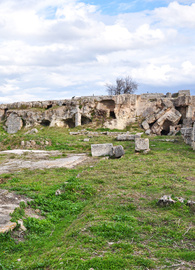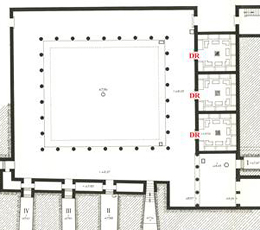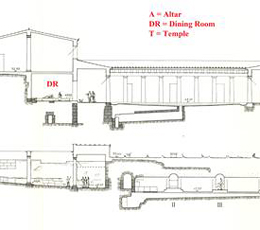1 Corinthians Week 7
Called to … Build One Another Up in Love: 1 Corinthians 8:1–11:1
Seattle Pacific University Professor of Educational Ministry
Read this week’s Scripture: 1 Corinthians 8:1-11:1
15:20

 Enlarge
Enlarge
In our longest passage to date, Paul addresses a key question facing the Corinthian believers: Should we eat food that has been sacrificed to idols? A burning question for the Corinthians in more ways than one! Paul offers a long, complex response that relies heavily on past and current examples for guidance. In fact, Paul emphasizes examples in Scripture as God’s way to “instruct [the Corinthians], on whom the ends of the ages have come” (10:11).
Now, unless I am wildly mistaken, eating food sacrificed to idols is not a burning question Christians face today. Finding ourselves in this passage requires careful attention to the story and creative imagination to hear God’s word for our lives. It means seeing this issue as an example for us. We can simply update Paul’s statement in 10:11: “These things happened to [the Corinthians] to serve as an example, and they were written down [by Paul] to instruct us [readers today].”
In this week’s Lectio, we will pay careful attention to the question faced by the Corinthian believers and identify how Paul used examples to frame his advice to the believers. The Lectio will conclude by inviting us to consider God’s word for us through this intriguing, if unfamiliar, example of food sacrificed to idols.
Getting the Story Straight
We can only read Paul’s answer, so it takes some guesswork to determine precisely the situation faced by the Corinthian believers. What concerned them deeply enough to seek Paul’s advice and what did the Corinthians believe they should do? Our guesswork on the specific situation is improved when we learn about the culture and social practices of first-century Corinth.
As mentioned in the first Lectio, Corinthian religious life revolved around its roots in Greek and Roman pagan religion. Offering sacrifices to various gods was an integral part of pagan religious practice. These sacrifices were offered at temples, such as the temple of Asklepios (god of healing) or the temple of Aphrodite (goddess of beauty and love).
There were two prevailing forms of sacrifice at a temple:
- A more every-day sacrifice, where individuals simply brought a sacrifice to the temple; and
- A more special-occasion sacrifice, where individuals rented a temple for private banquets and offered a sacrifice as part of the banquet meal [see Author’s Note 1].
In the former practice, part of the animal would be burned on the altar, part would be given to the priests, and the remainder would be sold in the “butcher shop.” In the latter practice, part of the sacrifice would be burned on the altar, part given to the priests, and the remainder served to the banquet guests. Paul seems to address both practices, though the Corinthians may have been primarily interested in the question of attending banquets in pagan temples.
Understanding what Corinthian believers thought about these two practices depends heavily on knowing when Paul is quoting Corinthian claims and when he is arguing with their claims [see Author’s Note 2]. The chart below briefly summarizes the claims and counterclaims on these two practices:
| The practice | What the Corinthians thought | What Paul thought |
|---|---|---|
| Attending banquets at temples where pagan gods are honored
|
It is okay, because …
“No idol in the world really exists” (8:4)
Baptism protects us from spiritual harm (10:1–13)
|
It is not okay, because …
A weaker Christian’s faith might be damaged by your action (8:9–12)
It joins you in partnership with idols and demons (10:20) |
| Purchasing meat that has been sacrificed to pagan gods, and eating it at home
|
It is OK because. . .
“Food will not bring us close to God” (8:8)
“All things are lawful” (10:23) |
It is okay as long as . . .
No one is offended by it (10:32)
Your own conscience is clear about it (10:25, 31)
|
We now turn to the three instructions we can glean from Paul’s counsel to the Corinthians.
Instruction #1: The Example of Love’s Priority (8:1–13)
In the first section of this week’s Lectio, 8:1–13, Paul tackles “the issue behind the issue” of eating food sacrificed to idols at a temple banquet (8:10). As the chart notes, some Corinthian believers saw no problem with this practice, based on their “special and superior knowledge” (8:7) that:
- “No idol in the world really exists” (8:4)
- ”There is no God but one” (8:4)
- “Food will not bring us close to God” (8:8)
Paul does not deny these claims. They are clearly true. But Paul places another factor in the equation. In the language of psychology, there is an “intervening variable” between what we know and what we do. That variable is love. The risk of superior knowledge is pride. In Paul’s terms, “Knowledge puffs up” (8:1). Once again, we see pride at the root of troubles in Corinth (3:21, 4:6–13, 5:2, 5:6). We need to be clear. Love and pride are each other’s real enemies, not love and knowledge. Paul hammers away at the Corinthians’ pride in their knowledge. He reminds them that humility requires a cautious perspective on how much we know (8:2).
On the other hand, “love builds up,” because it pays attention to the effects of behavior on others. Love motivates us to exercise restraint when we know our behavior has an adverse effect on others, even when we know our behavior is “right.” (8:9). When we fail to exercise restraint and thus knowingly damage a fellow believer’s faith, we are sinning against Christ (8:12). Paul concludes the section by stating he would rather never eat meat again than destroy another believer’s faith (8:13).
Instruction #2: The Example of Sacrificing Personal “Rights” for Greater Purposes (9:1–27)
Paul’s conclusion in 8:13 apparently raised again in Paul’s mind certain criticisms of his ministry in Corinth. Paul made certain sacrifices to benefit the Corinthians; they interpreted those sacrifices as a sign of inferiority. A specific sacrifice Paul made was to exempt the Corinthians from supporting his ministry financially. Paul now addresses criticism of this decision by showing his action was an example of Christ-like living.
Paul opens this section, 9:1–27, by claiming he was within his rights to ask for financial support. Paul justifies this claim based on several factors:
- The example of other apostles, who didn’t have to work for a living (9:6, 12)
- Standard practices of everyday life, when soldiers, farmers, and shepherds get paid for their labors (9:7)
- The ethics found in Scripture, where oxen must be allowed to eat while they are treading grain (9:8, 9)
- The practice of giving priests a share of food sacrificed on the altar (9:13)
Paul concludes this section by noting that the principle of sacrificing for the sake of a higher goal is embedded in the pattern of life. He appeals to the example of an athlete. If athletes sacrifice and exercise self-control in the pursuit of earthly glory, how much more should Christians be willing to sacrifice in pursuit of eternal glory (9:24–27).
Instruction #3: The Example of Pride Leading to a Fall (10:1–22)
In this section, Paul appeals to Old Testament stories to show the risk of pride [see Author’s Note 3]. In a complex and clever analogy, Paul compares the Israelites’ eating, drinking, and playing before the golden calf (10:7 and Exodus 32:1–6) to Corinthian believers’ eating and drinking before idols in temple banquets (1 Corinthians 10:21–22). Paul’s message is straightforward: If you think your spiritual knowledge or practices (baptism, Lord’s Supper) will protect you from displeasing God, think again! Look what happened to the Israelites. If spiritual pride makes you think you are standing, watch out that you do not fall (10:12).
With a proper dose of humility, Corinthians should recognize the temptation and flee from the worship of idols (10:14). They will see the absurdity of participating in a banquet for demons and the banquet of the Lord’s Supper (10:21). Such behavior can only provoke God’s judgment on the church (10:22).
Wrapping It Up: Focus on Freedom, Love, and Glorifying God (10:23–11:1)
In the concluding section of this week’s Lectio passage, Paul returns to core values Corinthians should employ in facing this particular issue. Since “the earth and its fullness are the Lord’s” (10:26, quoting Psalm 24:1), Corinthian believers are free to eat meat sold at the market or served in someone’s home. This liberty is constrained by love. Love builds up by seeking the good for others. If the Corinthians really seek to glorify God in everything they do, they will be following Paul’s example and the example of Christ by sacrificing personal advantage for the sake of others’ salvation (1 Corinthians 10:31).
Questions for Further Reflection
- In what ways do you find it a challenge to live as a follower of Jesus in a secular society?
- Is there a “practice” about which you wonder, “Should I or shouldn’t I be involved in this?”? How might this passage help you resolve the question?
- Were you taught to “flee” (10:14) any activities because they were “partnering with the world/demons” (10:20)?
- Are there limits to having our behavior determined by the weak consciences of others? What is the risk of freedom in Christ being “held hostage” by the convictions of others?
<<Previous Lectio Back to 1 Corinthians Next Lectio>>

This work is licensed under a Creative Commons License.







Very informative, thank you! I have been reading other commentaries and studying this with classmates but did not come across this historical and cultural information.
When legalism is involved, I think freedom wins.